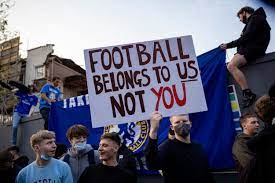By Paul Nicholson
September 28 – UEFA has dropped sanctions against all 12 clubs who had formed the European Super League (ESL) breakaway, following the ruling in a Madrid court ordering the European governing body to scrap any penalties imposed on Real Madrid, Barcelona and Juventus.
Late last night rumours were that UEFA was in the process of informing the Madrid court that it would comply with their ruling and drop proposed sanctions. This follows a decision by its independent UEFA Appeals Body that the opened “proceedings against Barcelona, Juventus FC and Real Madrid CF have been declared null and void, without any prejudice, as if the proceedings had never been opened.”
However, UEFA is doing so reluctantly and insiders say it is no less committed to opposing any breakaway league that splits European and world football.
Complying with the Madrid Court, UEFA will extend that suspension of sanctions, for the moment at least, to the other nine clubs who had been part of the breakaway but had resigned from the Super League.
Those nine clubs had already agreed to give up 5% of revenue for one season playing in Europe (starting in 2023-24) as a punishment for having initially been members of the ESL. They had also agreed to make a combined €15 million goodwill contribution to benefit children’s and grassroots football across Europe.
UEFA said it “has informed the 9 Clubs that in view of the pending Court proceedings in Madrid, and to avoid any unnecessary complication, UEFA will not request payment of any of the amounts offered in the May Declarations of the Clubs, as long as the Court proceedings in Madrid involving, among others, UEFA are pending.”
It was not clear whether the sanctions would be waived completely or would just be suspended pending further review.
The decision appears to have been taken after much consultation within UEFA and its senior members, but with the common belief that the judicial process needed to be respected and that defying the Spanish ruling would not at this stage be in the interests of either UEFA or its member associations.
“UEFA understands why the disciplinary proceedings are declared null and void. UEFA has always acted in good faith and reasonably understood that the decision by its independent disciplinary body, the UEFA Appeals Body, to suspend the disciplinary proceedings was in full compliance with the Court Orders of the Madrid Commercial Court No. 17, and given that the three mentioned clubs have since been admitted to UEFA club competitions. UEFA maintains its view that it has always acted in accordance with not only its Statutes and Regulations, but also with EU law, the European Convention on Human Rights and Swiss law in connection with the so-called Super League project,” said a UEFA statement.
It does not indicate a reversal of UEFA’s opposition to the breakaway European Super League proposal that potentially threatened to reshape the whole of European club football.
Insideworldfootball sources report that the Spanish court ruling has only further galvanised institutional opposition from the game’s major stakeholders both against the proposal and in particular the three pariah clubs – Barcelona, Juventus and Real Madrid – that have refused to back away from the ESL proposal.
UEFA said it “will continue to take all necessary steps, in strict accordance with national and EU law, in order to defend the interests of UEFA and of all football stakeholders.”
What looks like being celebrated as a major win for those three clubs could turn out to be an increasingly hollow victory, and one that could do them more harm than good, such is the depth of feeling against their leadership and owners. At press time there had been no reaction from the nine clubs who had broken away from the ESL project.
The ESL project was announced in April with 12 clubs but collapsed within four days of its hasty unveiling following vehement protest from fans, politicians and football stakeholders, as well as from UEFA and, somewhat begrudgingly, FIFA.
What was remarkable about the opposition to the competition was that it was both universal and uncoordinated with fan groups even taking to the streets to protest against their club owners and the ESL outside their club grounds.
It was a fan movement that immediately sparked support from governments and even the European Union towards maintaining and recognising the sporting integrity of the European game as a whole, rather than the financial greed of 12 clubs and their owners.
The six English clubs in the breakaway – Arsenal, Chelsea, Tottenham Hotspur, Manchester United, Liverpool and Manchester City – rapidly withdrew from the ESL and apologised to fans. They were rapidly followed by Atletico Madrid, Inter Milan and AC Milan.
UEFA believes that the power of the universal fan opposition to the ESL – and most notably from the fans of the 12 clubs that attempted the breakaway – is a force that must be listened too and which will ultimately be key in the battle to protect the European game.
Clearly that tidal wave of public and institutional opposition to the ESL project was not enough to overcome the opinion of Judge Manuel Ruiz de Lara in the Madrid commercial court No. 17 who had also ruled UEFA cannot legally force organisers of the Super League to dissolve the project or impose €100 million fines on any other clubs wishing to re-establish the concept in the future.
Contact the writer of this story at moc.l1743733640labto1743733640ofdlr1743733640owedi1743733640sni@n1743733640osloh1743733640cin.l1743733640uap1743733640

